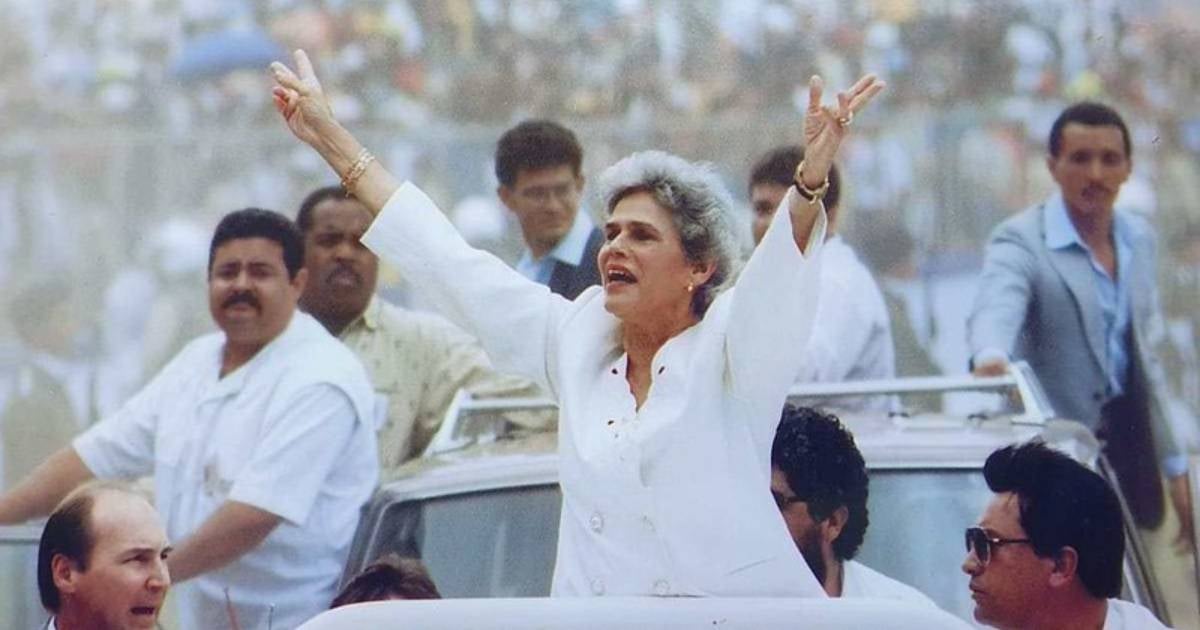Violeta Barrios de Chamorro, the first woman to be elected President of Nicaragua and a prominent figure of reconciliation after the country's civil war, passed away on Saturday in San José, Costa Rica, at the age of 95. Her son, journalist Carlos F. Chamorro, confirmed her peaceful passing, surrounded by her children and loved ones, after a lengthy battle with illness. Her departure marks the end of an era for a pivotal figure in Central America's recent history.
Barrios de Chamorro was not only the first female to lead a Central American nation through direct election but also a beacon of hope for a nation scarred by decades of dictatorship and conflict. Her presidency, spanning from 1990 to 1997, symbolized the cessation of a fratricidal war and the dawn of a democratic transition, a reality that now feels distant to many Nicaraguans.
Unexpected Victory and Political Legacy
Violeta ascended to power leading a coalition opposed to the Sandinista National Liberation Front (FSLN), astonishing many by defeating Daniel Ortega in the 1990 elections. This triumph was born from tragedy: her husband, journalist Pedro Joaquín Chamorro, was assassinated by the Somoza regime in 1978, inadvertently propelling her into the political arena.
During her tenure, Barrios de Chamorro prioritized peace in a nation weary from conflict. Although she delegated numerous governmental responsibilities, her image as a nurturing, serene, and devout leader was enough to unify vast segments of Nicaraguan society. She eschewed vengeance, facilitated the disarmament of armed groups, and laid the groundwork for a fragile democracy.
Exile and Final Days
In October 2023, with her health failing and facing pressure from Ortega's regime, she was discreetly moved from Managua to Costa Rica, where she spent her final days. Her family announced that her remains would temporarily reside in San José "until Nicaragua becomes a Republic again," a statement that resonated deeply with the Nicaraguan exile community.
"She concluded her presidency, allowing space for other political leaders; the current state of Nicaragua is vastly different from what Doña Violeta envisioned," remarked political scientist Elvira Cuadra, a critical voice in exile.
Cross-Border Legacy
Her life was a tapestry of contradictions and sacrifices. A member of one of Nicaragua's most influential families, Violeta was the wife of a martyr, the mother of ideologically opposed children during the war, and ultimately, a symbol of a possible nation.
Her legacy invites reflection from Cuba: what role can a woman with convictions play amidst authoritarianism? What can a nation achieve when it embraces forgiveness, transition, and democratic openness? Her example speaks to the Cuban people, who have also faced repression, exile, and unfulfilled hope.
"Doña Violeta died peacefully," her family stated, "and now rests in the peace of the Lord." May her legacy inspire new struggles for democracy and justice in all places where freedom remains elusive.
Violeta Barrios de Chamorro's Impact on Nicaragua
What were Violeta Barrios de Chamorro's significant contributions as President of Nicaragua?
Her presidency marked the end of a civil war and initiated a democratic transition, prioritizing peace and unity in a divided nation.
Why did Violeta Barrios de Chamorro go into exile?
In 2023, due to her deteriorating health and the oppressive environment under Ortega's regime, she was moved to Costa Rica.
How did Violeta Barrios de Chamorro's life influence Nicaragua and beyond?
Her leadership and personal sacrifices made her a symbol of hope and reconciliation, inspiring nations facing similar authoritarian challenges.
